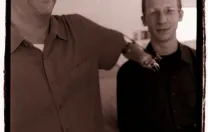Had it not been for the “Living with Life-Threatening Illness” course, Christie Thorne Sullivan and Tabatha Williams-Mike would probably never have crossed paths. Sullivan was a white, 25-year-old aspiring physician from an affluent Connecticut town; Tabatha was a 33-year-old African-American woman living with her husband and two children in inner-city Boston. An untreatable case of anal-rectal cancer had left her in excruciating, body-contorting pain.
For several months in the spring of 2004, however, these two spiritual women connected powerfully with each other through the class, exchanging their life stories, fears, and dreams during home and hospital visits. When, in mid-April, “Tab” was readmitted to the hospital and sensed her time was drawing near, she made sure to thank each of her caregivers for their help. Sullivan, the observer-turned-confidante, reported that she had her own special goodbye.
Depending on the day, we would talk or read the Bible, or I would fix Tab’s pillows. That afternoon, she told me to pull my chair up as close as possible, and to lean my head in. She squeezed my hand. Why did I have the feeling she was the one who was trying to comfort me? Wasn’t it supposed to be the other way around? She said, “I’m ready to die. I’m not giving up, Christie. But I’m doing what God wants me to do. I’m so happy.” By seeing Tab’s peace and happiness in this moment that society usually views as so tragic, I felt like I, too, could be at peace.
Tabatha Williams-Mike and Christie Thorne Sullivan found they could be at peace together. Photograph courtesy of Christie Thorne Sullivan In saying her goodbye to me that day, Tab made it clear that she wanted me to embrace life the way she had. She wanted me to rejoice at her new beginning and new peace. She told me how special I am to her, and how happy she is that I met her family. She said, “You’ve been here every single day, and now you are my family.”
Although Tab did most of the talking, I was also able to tell her how grateful I was for the multitude of things she taught me. I told her how much I valued our relationship, and how beautiful and strong and inspirational she was. So much was said in those 20 minutes. I vividly remember walking out of her hospital room that afternoon, knowing that I had said my final goodbye to a woman of incredible strength and wisdom, and yet feeling like my life had been uplifted by doing so. I walked home feeling strong and feeling closer to God than I had felt in a very long time.







